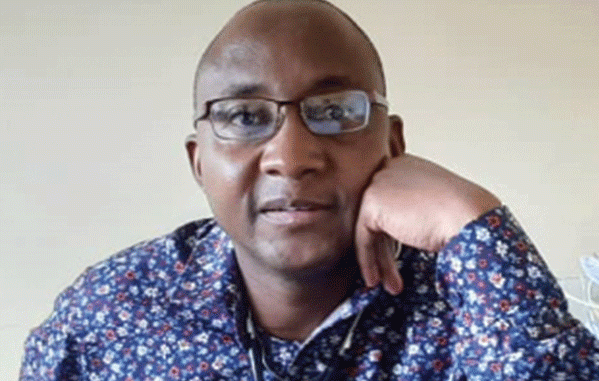
By Johannes Marisa COVID-19 might be nearing its end after more than two years of tormenting us. More than 6,3 million people succumbed to the virus globally, with Africa losing about 240 000 people.
Prominent people lost their lives, including renowned doctors who tried their best to subdue the toxic effects of the virus.
Today, there is concern about the monkeypox virus, which has been recorded in more than 21 countries.
Although monkeypox has been endemic in many African countries, it raises alarm today as it comes as an outbreak which can threaten many borders across the world.
The United Kingdom had its index case on May 6 after a citizen had returned from Nigeria two days earlier.
Since then, Europe has witnessed an outbreak of the monkeypox, with countries like Germany, Italy, Belgium, Portugal, Netherlands, Sweden and France recording cases.
The United States and Canada have recorded cases and fear is now gripping the globe.
Outbreaks come and go, but they have the capacity to leave a trail of destruction. Many lives are lost, economies battered while social life is annihilated.
- Chamisa under fire over US$120K donation
- Mavhunga puts DeMbare into Chibuku quarterfinals
- Pension funds bet on Cabora Bassa oilfields
- Councils defy govt fire tender directive
Keep Reading
Public health measures in place are a thorn in the flesh for many people. Livelihoods are toppled for many people.
However, there are some lessons that we get from such outbreaks that can shape health service delivery in any country.
The health sector in Zimbabwe has been marred by incessant strikes, poor infrastructure, shortages of equipment and resources, understaffing, untenable laws and regulations, low investment, maladministration and general poor financing.
The consequences are very clear: poor health service delivery which cannot withstand outbreaks or other medical emergencies.
For real, COVID-19 has taught us great lessons and correcting some of the mistakes will significantly improve our health service delivery.
Africa demonstrated to the world that it is a solid continent that can fend off outbreaks and can even perform better than many of the developed nations.
Peru lost around 213 000 people from COVID-19, slightly less than 254 000 people who succumbed to COVID-19 in Africa as a continent.
COVID-19 brought some positives which include the following:
- The realisation that healthcare workers are critical at all times let alone times of outbreaks.
Healthcare workers should have their grievances attended to expeditiously as they face risks daily in their line of duty.
Government should urgently address grievances of healthcare workers in order to stem brain drain which has been rampant lately.
Zimbabwe lost 2 100 healthcare workers in 2021, 1 800 of which were nurses. Scotland seems to be the biggest beneficiary at the moment.
- The appreciation that Africa is a studious continent that can stand tall against whatever medical misadventure the world can experience.
Genomic sequencing done in South Africa showed two stubborn variants of concern, 501Y.V2 and Omicron, which were reported to the World Health Organisation. Africa was on top of the situation.
The US lost more than one million people, while Africa lost only a quarter of that, thanks to robust public health measures that were enforced.
- The appreciation that health funding is of paramount importance. The Abuja Declaration of 2001 recommended at least a 15% allocation to the health ministries from the national budget.
A lot of health infrastructure is required in Zimbabwe and that includes oxygen processing plants, new equipment which includes ventilators and admission facilities.
There is need to train more staff, especially those required in the critical areas of health like intensive care nurses, anaesthetists, ambulance technicians et cetera.
- The realisation that cross-border co-operation is important during pandemics and the subsequent sharing of information contributed to successful anti-COVID-19 campaigns.
No country could stand alone during the peak of COVID-19. Collaboration with non-governmental organisations (NGOs) is vital as these organisations can assist in the testing, contact-tracing, surveillance and even treatment of patients.
Mutual relationship between government and NGOs should exist for the betterment of the nation.
- The realisation that vaccination remains the most critical public health measure against outbreaks.
In 1957 during the Asian flu pandemic, Maurice Hilleman, an American microbiologist, came up with a vaccine just four months after the onset of the pandemic.
The vaccine halted the H2N2 virus and the pandemic came to an end. COVID-19 vaccines brought relief as the virulence of the virus was reduced significantly.
- The realisation that personal hygiene is key throughout one’s life. One does not need to wait for an outbreak in order to do proper hand-washing or sanitisation.
Other diseases can also be stopped like flu, common cold, typhoid, cholera, dysentery monkeypox et cetera.
Let all the health stakeholders learn from the COVID-19 attack and rectify where possible. The world remains under threat from outbreaks, especially coronaviruses.
We are proud that Africa managed COVID-19 better than expected.
Together, we will defend our countries!
- Johannes Marisa is president of the Medical and Dental Private Practitioners Association of Zimbabwe. He writes here in his personal capacity.











